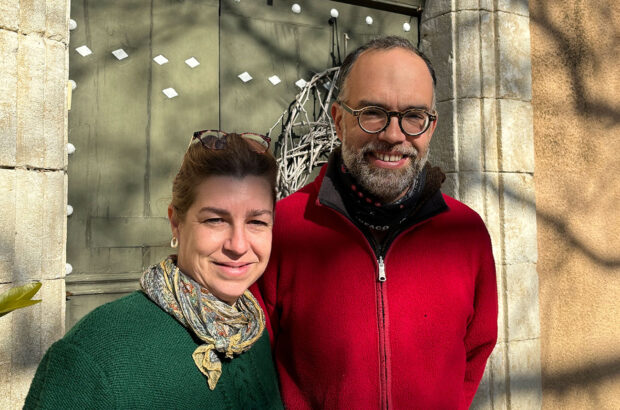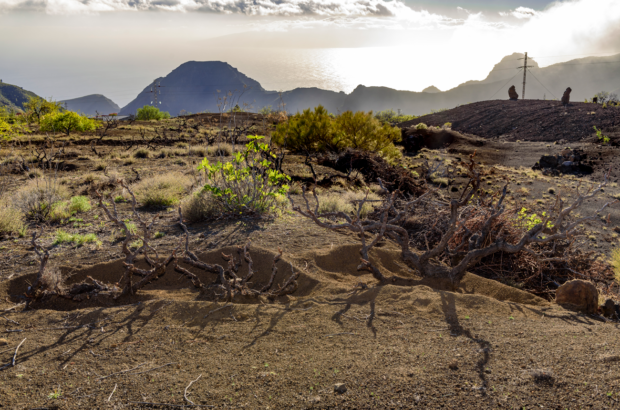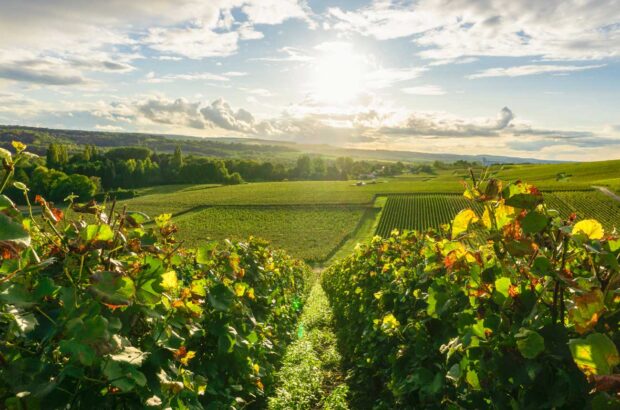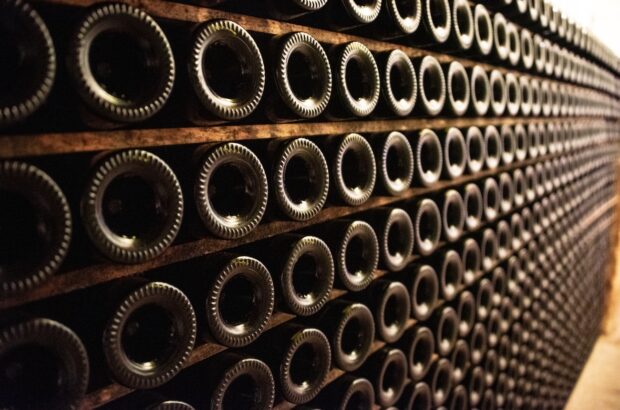Vineyard knowhow
‘Vineyard days’ start early for Wine Production students at Plumpton, says vineyard instructor and lecturer Tom Newham, pointing at the diligent silhouettes, all in waterproof jackets, scattered around Rock Lodge Vineyard.
The historical vineyard was first planted in the 1960s in Scaynes Hill, Haywards Heath. It used to be owned by Chapel Down until Plumpton College took it over in the 1990s.
A 20-minute drive from the main campus, the site now supplies the raw material for Plumpton College’s own commercial winery – Plumpton Estate – which produces 15,000-20,000 bottles of wine commercially each year.
Despite the chilling morning drizzle, spring was most certainly in the air at the end of March. These keen students – aged from 20s to over 60 – were working in pairs, busy finishing their spring pruning and tying up the canes to the trellises.
BSc students specialising in Viticulture and Oenology are expected to attend vineyard work for at least one day per week during their first year and are each responsible for a few rows. The MSc students, on the other hand, conduct themed varietal research here.
For those already working with a wine producer, there is also the opportunity to take part in an apprenticeship programme, says viticulture apprenticeship programme manager Charles Negus. He adds that the college is already collaborating on the project with around 40 English producers, such as Hambledon, Wiston Estate and Rathfinny.
Gloomy weather combined with heavy soil (alluvial and clay), the muddy, low-land plot we were standing at can give the most capable wine-growers headaches. But this ‘happy coincidence’ is a perfect training ground for those learning to grow and produce top-notch English sparkling wines, according to the lecturers.
During their field days, students are trained to cope with almost everything that could happen around a vineyard; dealing with wet conditions and treating vineyard diseases, finding spots easily affected by frost, managing pests, birds and insects population on the site, and indeed, driving a tractor.
Besides the Champagne trio, students also try their hands at cool-climate grapes commonly seen in English and Welsh vineyards, such as Bacchus, Riesling, Seyval Blanc and Ortega, in addition to experimental plantings of disease-resistant PIWI varieties.
The choice of varieties needs to be both educational and commercially sound, explains Dona Frost, viticulture apprenticeship programme leader.

Tom Newham (left) and Charles Negus (right). Credit: Sylvia Wu
Plumpton Wine Division: A brief history
Established in 1926, Plumpton College is a land-based college located in East Sussex.
Among livestock barns, greenhouses, varied workshop facilities and the new AgriFood Centre on campus, sits the purpose-built wine centre, which encompasses a tasting room, research centre, laboratories and the college’s own commercial winery. 15,000-20,000 bottles of wine are produced for sale each year under its symbolic wavy roof, which is said to resemble the rolling hills of the Sussex Downs.
The Wine Division at Plumpton College took shape in 1988, when Bordeaux-trained winemaker Chris Foss initiated part-time courses on vine growing and winemaking with just two rows of vines. In 1992, the college launched its Higher National Diploma (HND) courses with the University of Brighton.
Today the Wine Division has evolved to become ‘the only academic provider of studies in Viticulture and Oenology at undergraduate and postgraduate levels in the UK’, according to its website.
Each year, the Wine Division takes in up to 30 Viticulture & Oenology students at the BSc level, and a further 15 for MSc studies. It also offers a BA in International Wine Business, enrolling a maximum of 20 students per year, as well as foundation degrees in both Wine Business and Production. An array of short courses, including WSET qualifications, is also available for part-time studies.
In December 2022, Plumpton College announced a new validation partnership with the University of Greenwich.
A complete toolkit

Paul Harley in ‘Henry’s Marani’. Credit: Sylvia Wu
Commercial viability is also something to keep in mind when it comes to winemaking practice, according to Deepika Koushik, Plumpton Estate’s winemaker.
In her campus winery, a complete tool kit – from laboratory facilities, wine press, various-sized small tanks and oak barrels, to riddling and disgorging machines – is prepared for future winemakers to hone their skills in producing marketable sparkling (which, of course, is the speciality at Plumpton) and still wines.
While pouring fresh tank samples into our glasses, Koushik says that she needed to monitor the SO2 levels, but was happy to leave the rest to her students: ‘If they are to make mistakes, it’d be better that they make them here.’
For more experimental winemaking, students have access to the Rathfinny Research Winery (named after its sponsor), opened in 2014 by Queen Camilla (who also planted the UK’s millionth vine in Plumpton in 2017), the same year in which Plumpton College introduced the UK’s first MSc in Viticulture and Oenology.
With formulas and notes written all over the whiteboards, beakers, buckets and test tubes scattered around the table and demijohns filled with wine-in-the-making stashed in industrial refrigerators, the research centre is on the front line in resolving queries from cool-climate producers from the UK and overseas.
A short walk from the modern facilities and we found the hidden ‘Henry’s Marani’, a working Georgian qvevri museum and winery. Founded by wine importer Henry Mchedlishvili in 2017, the small, authentic marani (‘winery’) is the first of its kind ever built in the UK. A dozen of various sized qvevris are buried underground, ready to be used for making orange and red wines with additional tannin and structure, following the Georgian tradition.
‘Industry relevant’

Dr Akshay S. Baboo. Credit: Sylvia Wu
‘It gives you a really good breadth of knowledge – yes they push you hard for theory but they also encourage you to do a lot of practical,’ says Marcus Rayner, winemaker of Wiston Estate, recalling his days at Plumpton.
Rayner’s winemaking career started straight after completing his BSc in Viticulture & Oenology.
‘I handed in my assignment and I got the job (at Wiston Estate) in May 2018. I was able to walk in and set up a proper laboratory for the estate, with the help of my wife, Megan, who graduated in the same year, using the techniques we learnt at Plumpton and previous harvest vintages.’
The phrase ‘industry relevant’, which appears repeatedly on Plumpton College’s website and brochures, resonated with the lectures and activities we experienced during the day’s visit.
At the ‘luxury wine marketing’ lecture, the BA Business students presented their analysis of the branding strategy of several renowned international producers, based on their current website design.
Dr Akshay S. Baboo, programme manager for the Viticulture and Oenology BSc, demonstrated how to measure free SO2 in wine by titration. In his winemaking lecture, he explained the reasoning and methods of controlled oxidation during ageing. The small-sized class of fewer than 10 (some joined virtually) encouraged lively interaction between the lecturer and students, leaving no questions unanswered.
In the state-of-the-art laboratories, Baboo’s students are working on their own research projects that cover some of the most fascinating and heated topics in the winemaking scene at the moment; such as the flavour profiles of PIWI varieties and low-alcohol traditional method sparkling wines, to name a few.
For tasting skills and general knowledge of the wine world, the WSET Level 3 curriculum forms part of Plumpton’s degree-level courses, while many full-time students strive to achieve the WSET Diploma during their time at Plumpton.
In addition to the classic tasting samples for the WSET curriculum, lecturers at Plumpton keep a selection of niche and less common examples in their wine fridge, including no/lo and even flavoured wines.
It’s essential that these future wine professionals have the opportunity to explore the ‘boundaries of flavours’ for commercial productions, says Paul Harley, programme manager for the International Wine Business BA.
A hub of connections

Credit: Sylvia Wu
In the Institut Oenologique de Champagne-sponsored sensory evaluation room – where WSET courses are conducted at Plumpton – the sponsor stickers on each individual tasting booth are especially eyecatching.
From the WSET school itself to renowned wine experts, fine-dining restaurants and English producers, the stickers are only one piece of evidence of the Wine Division’s proud industry network.
‘The Wine Division at Plumpton is a close-knit community,’ says decanter.com’s own assistant editor, Elie Lloyd Ellis, who enrolled in a part-time Foundation Diploma in Wine Business at Plumpton when she decided to divert to a career in wine.
‘The industry contacts that I made there in terms of guest speakers, staff and fellow students – many of whom have gone on to positions in production, marketing and retail to name a few – have been highly valuable in terms of career development.’
And the network is expanding beyond borders; Angela Chow is one of the international students we met at Plumpton. After studying film production back home in Hong Kong, Chow was seeking career opportunities in the UK when she found out about Plumpton online. Committed to a BA Wine Business course, she was working on a research project on Chinese fine wines while doing an internship at Majestic.
When speaking about the biggest strengths of Plumpton as a wine education provider, Dr Gregory Dunn, head of Plumpton Wine Division, stressed its English-taught courses and its proximity to the Old World countries.
The future vision of Plumpton, says Dunn, is to build on the college’s national renown and attract more international students, currently from countries including South Africa, India and China, to be trained at Plumpton, so that they can pave a career in wine in English-speaking countries.
The legacy, the future

Rock Lodge Vineyard. Credit: Sylvia Wu
At the end of the visit, I went home with ‘Essays on English Sparkling Wine’, a book that collates the recent research outcome of the Production and Business students at Plumpton.
These essays cover a diverse range of topics; from trendy subjects such as English wine tourism and the sensory profile of English sparkling wine, to a technical exploration of the usage of oak, dosage and malolactic fermentation in sparkling winemaking. The detailed comparison of the climates of Champagne and Southern England, in addition to initial studies on the soil and clones seen in English vineyards, provides fresh reference points for journalists, marketers, investors and wine-growers on the ground.
While the wine world sheds light on the rising quality of English sparkling wines, it is ‘vital to have in-depth, up-to-date research material available to aid new producers with every aspect of the winemaking process – from initial vineyard selection right through to the challenges of marketing and selling the finished products’ as Susie Barrie MW writes in her foreword.
And that’s exactly what Plumpton is well positioned to do. A unique hub of knowledge, experience and connections that have nourished a generation of wine talents in the UK in the last 30 years, the Wine Division is set to shape the future of English wines and beyond.







